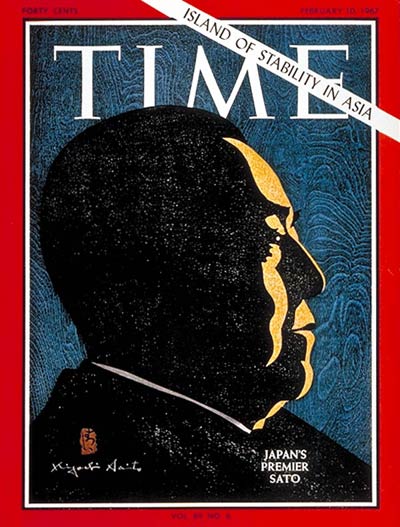
Milestone moments do not a year make. Often, it’s the smaller news stories that add up, gradually, to big history. With that in mind, in 2017 TIME History will revisit the entire year of 1967, week by week, as it was reported in the pages of TIME, to see how it all comes together. Catch up on last week’s installment here.
In Japan, the leading Liberal Democratic Party — which, confusingly, represented the conservative side of the nation’s politics — had stayed in power despite expecting election setbacks. That event provided an opportunity for TIME to profile the nation and its Premier, Eisaku Sato.
The magazine presented Japan — the richest nation in Asia — in contrast to its neighbor, China, which was in the middle of a chaotic period of upheaval. Although Japan kept an even keel, as its recent elections had shown, the nation was experiencing its own kind of change, as citizens and observers alike wondered whether Sato and his government would begin to push Japan out of the post-World War II bubble in which it still resided:
[Japan’s intellectuals] recognize the diversity in the Communist world, contend that unfettered by ideology, Japan should be ready for all sorts of actions or options. In their demands for a more sophisticated foreign policy, they have given impetus to Premier Sato’s idea of a Japan fully involved with the rest of Asia. Their leader is Tokyo University Professor Yonosuke Nagai, 42, who maintains that the Sino-Soviet split and the unspoken “cold alliance” between Russia and the U.S. have given Japan the chance to recover power. Thus, while Japan is undoubtedly a bulwark of democracy in Asia, the U.S. will have to learn not to lean too hard on it or to take Japan for granted. Eventually, Japan will be strong and confident enough to go her own way—and that way may not always be precisely the U.S.’s way.
For now, though, most Japanese—including many of its government leaders—are quite content to remain passive and to rely totally on trade with the West and the U.S. nuclear umbrella to prolong the 21-year postwar honeymoon of peace and prosperity. After all, Article 9 of the U.S.-imposed constitution forbids war for any purpose but “self-defense.” Japan today spends less on defense ($1.3 billion a year, or barely 1% of its gross national product) than any other major industrial nation.
That said, the magazine also used the opportunity to present an overview of Japanese culture. While certainly indulging in some stereotypes (the average Japanese person “sees no absurdity in sitting on a tatami mat in loose-flowing kimono to eat a breakfast of cornflakes and coffee”), was a relatively nuanced look at the best the country had to offer, from novelists like Kenzaburo Oe to filmmakers like Akira Kurosawa and artists like Kiyoshi Saito, who had created that week’s cover image.
Surprise bestseller: Sen. Everett McKinley Dirksen’s recitation album Gallant Men: Stories of the American Adventure was a big hit — prompting a dust-up between the Senator (who opposed compulsory union membership) and the American Federation of Television and Radio Artists, which insisted that he owed fees and dues.
Beard police: An interesting side note to Cold War concern over the doings of communist nations comes courtesy of this odd little item in the world news section, reporting that Romania had banned beards.
Abortion debate: The religion section presented an overview of the growing debate over legalizing abortion in the United States, as individual states and several other religious groups found themselves in opposition to the Catholic Church’s strict anti-abortion stance. The more permissive stance lined up with public opinion, the story noted, as a survey had found that “71% favored legal abortion when the woman’s health is seriously endangered, 56% when the pregnancy resulted from rape, and 55% when there is strong likelihood that the child would be born defective.” And, though the conversation about abortion has changed, that feeling has remained substantially the same: as of mid-2016, Gallup found that 79% of respondents believed the procedure should be legal in some or all cases.
Future tech: These days the use of a beeper or pager may seem like something straight out of Clueless, but it turns out the technology is a lot older than that, as TIME reported on their usefulness in the late ’60s: “With receivers as small and totable as a hip flask, one-way radio pagers are now a hot item. Some emit only a beep that tells the recipient to call his office from wherever he is. Others give out a beep-voice combination. Either way, the system is simple in concept: Party A wants to reach Party B, who is nowhere near a telephone. Party A calls a radio-paging center. There, an operator sends out an individually toned beep, or a voice instruction, to Party B, who is wearing a paging device. Party B goes to a telephone and calls in, or follows the vocal instruction.”
Great vintage ad: Here’s your reminder that color TV was still a new and exciting — but unreliable — technology.
Coming up next week: A cover story about Sen. Edward Brooke
More Must-Reads From TIME
- The 100 Most Influential People of 2024
- Coco Gauff Is Playing for Herself Now
- Scenes From Pro-Palestinian Encampments Across U.S. Universities
- 6 Compliments That Land Every Time
- If You're Dating Right Now , You're Brave: Column
- The AI That Could Heal a Divided Internet
- Fallout Is a Brilliant Model for the Future of Video Game Adaptations
- Want Weekly Recs on What to Watch, Read, and More? Sign Up for Worth Your Time
Write to Lily Rothman at lily.rothman@time.com